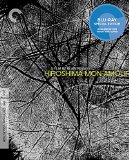| Reviews & Columns |
|
Reviews DVD TV on DVD Blu-ray 4K UHD International DVDs In Theaters Reviews by Studio Video Games Features Collector Series DVDs Easter Egg Database Interviews DVD Talk Radio Feature Articles Columns Anime Talk DVD Savant Horror DVDs The M.O.D. Squad Art House HD Talk Silent DVD
|
DVD Talk Forum |
|
|
| Resources |
|
DVD Price Search Customer Service #'s RCE Info Links |
|
Columns
|
|
|
Hiroshima mon amour: Criterion Collection
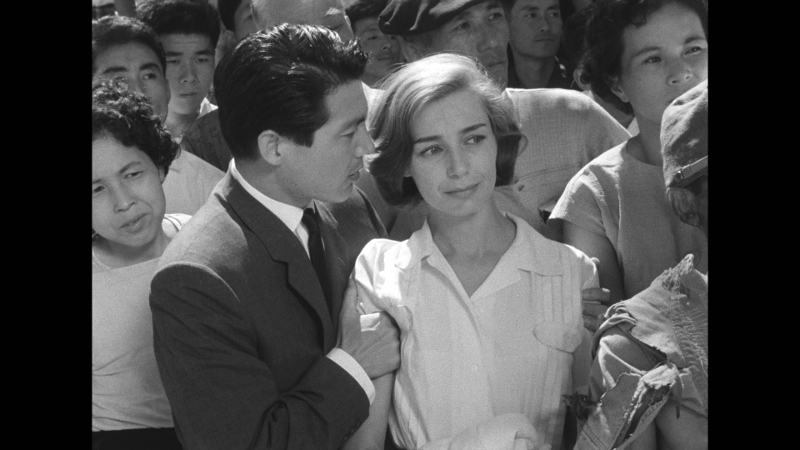 Alain Resnais' Hiroshima mon amour follows a nameless French actress (Emmanuelle Riva, in her first film role) and Japanese architect (Eiji Okada, Woman in the Dunes) as they engage in a short, 36-hour affair in his hometown of Hiroshima where she's working. It's been 15 years since America's destruction of the city via atomic bomb, but this man and woman are still struggling to understand its lasting, profound impact on both of their lives. Intercut with stock footage from the war and partially shot at the Hiroshima Peace Memorial Museum, the film's non-linear structure and looped narration create a dreamlike state that's occasionally interrupted by sharp doses of reality. As a front-runner for the French New Wave, Hiroshima mon amour's stylish quirks and visuals seem commonplace now but made huge waves upon its initial release, earning the film both an International Critics' Prize at that year's Cannes Film Festival and an Oscar nomination for Marguerite Duras' screenplay, the film's singular voice was actually the product of a joint production between Japanese and French film professionals; like the story itself, Hiroshima mon amour doubled as two separate divisions of people learning to understand one another. Music plays an important role in just about every film...but in Hiroshima mon amour, it's almost as important as the dialogue. Composed by Georges Delerue (A Man for All Seasons, The Day of the Jackal) and Giovanni Fusco (L'Avventura, L'Eclisse), the score definitely has its own personality, alternating between quiet, meditative pieces and more playful moments that don't always reflect what we'd call "a perfect marriage" with the subject matter. Though jarring for first-time viewers, the score refuses to cheapen the occasionally horrific visuals with downbeat tempos and mournful violin solos. It's a big risk that pays off during repeat viewers and, for those familiar with Resnais' work, will instantly remind them of Hanns Eisler's score for his earlier short film, Night and Fog. I'll admit that it distracted me when I first saw it years ago...but now, I couldn't imagine Hiroshima mon amour sounding different. But the visuals, of course, remain the real star of the show. The tempo is abrupt at times but almost dreamlike during the bulk of this production; three separate editors are credited (Jasmine Chasney, Henri Colpi, Anne Sarraute), as well as two cinematographers (Michio Takahashi and Sacha Vierny)...but, like the music itself, almost everything feels like it came from the mind of one person. In the meantime, Resnais' stylish direction ties everything together almost perfectly: Hiroshima mon amour is famous for its liberal use of unannounced flashbacks that force first-time viewers to stay on their toes during what amounts to a chopped-up story that spans just 36 hours. We're entirely used to watching movies this way now...but this works as both a highlight and a handicap more than 50 years later, as Hiroshima mon amour fits in almost too perfectly with the modern sensibility of what movies should feel like. But it still feels like a product (ahead) of its time, and one that should continue to hold up for decades to come. Hiroshima mon amour was first released on DVD by Criterion in 2003, well past the average acceptable window for a Blu-ray upgrade. And what a well-rounded upgrade this is: Hiroshima mon amour has since been blessed with a recent 4K restoration and even a handful of new and recent bonus features. Overall, I'd imagine that die-hard fans will dive on this immediately, while anyone curious enough for a blind buy will certainly get their money's worth.
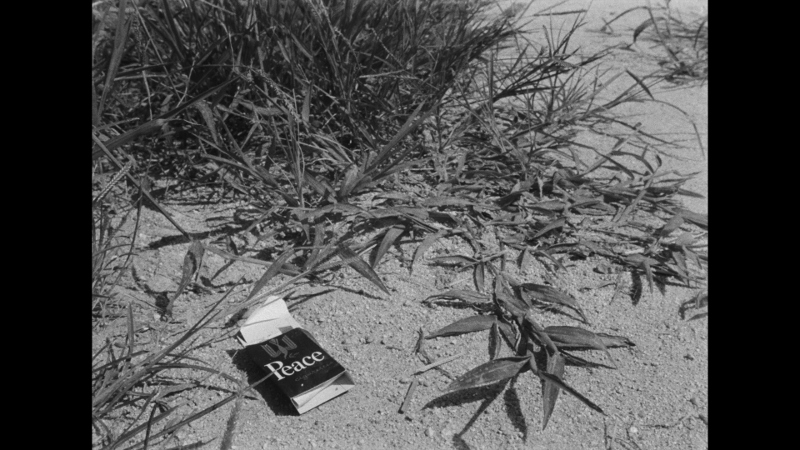
Presented in its original 1.37:1 aspect ratio, Hiroshima mon amour looks different than Criterion's 2003 DVD, but for all the right reasons. This new 1080p transfer was sourced from a 2013 4K master by Argos Films, Technicolor, The Groupama Gan Foundation, and Cineteca di Bologna, and it's not surprising that image detail and overall clarity has been given a substantial boost. Textures and contrast levels are extremely consistent and smooth, while black levels are much deeper than before. In an accompanying feature, restoration contributors Davide Pozzi and Renato Berta admit that this digital restoration allowed them to push the blacks levels further but, without the late director's participation, they can only hope it was a decision he would've agreed with. Either way, at worst it's still a fair trade for the numerous benefits of this new transfer. Only a handful of scratches and debris marks can be spotted along the way, while the limited amounts of stock footage obviously look much rougher in direct comparison.
DISCLAIMER: The screen captures featured in this review are strictly decorative and do not represent Blu-ray's native 1080p image resolution. The uncompressed French PCM 1.0 mono track is perfectly acceptable overall, as neither the dialogue nor Georges Delerue and Giovanni Fusco's music fights for attention. It's largely free of distortion, clipping, and all the usual defects associated with a film of this age, and even manages to display modest amounts of depth at times. Optional English subtitles have been included for the French audio and partial Japanese and French text translation only.
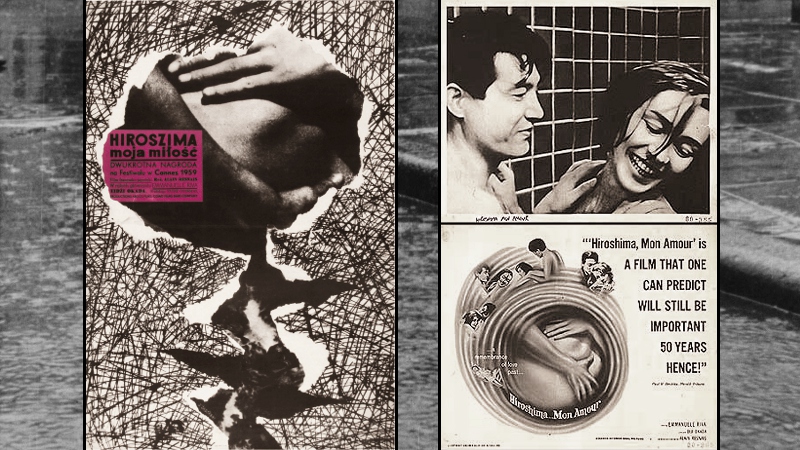
The new bonus features lead off with a pair of new Interviews with film scholar Francois Thomas (27 minutes) and USC music and journalism professor Tim Page (11 minutes) discuss the film's production history and soundtrack, respectively. Recorded earlier this year. they're filled with excellent second-hand information that fans will enjoy. Also included is the aforementioned Restoration Featurette (11 minutes) featuring comments from restoration contributors Davide Pozzi and Renato Berta. A handful of comparison clips are briefly shown, but the bulk of this filmed interview is an oral overview of the efforts taken to restore the film from its original negative and a handful of duplicate prints. So while it's not exactly hands-on nor was it produced during the film's restoration, this 2014 piece is definitely a keeper.
Alain Resnais' Hiroshima mon amour has easily withstood the test of time since 1959, doubling as a potent human drama and an invaluable time capsule. Incredibly stylish and stuffed with unforgettable visuals, it's an intimate but ambitious (and completely accessible) production that can't be seen just once, thanks in part to Resnais' poetic direction and Marguerite Duras's excellent screenplay. Criterion's updated Blu-ray edition easily trumps their 2003 DVD, aided by a terrific new 1080p transfer (sourced from a new 4K master) and a trio of appropriate new bonus features. Die-hard fans will most likely want to upgrade as soon as possible, while interested new viewers should definitely consider this the best version of Hiroshima mon amour currently available. Highly Recommended.
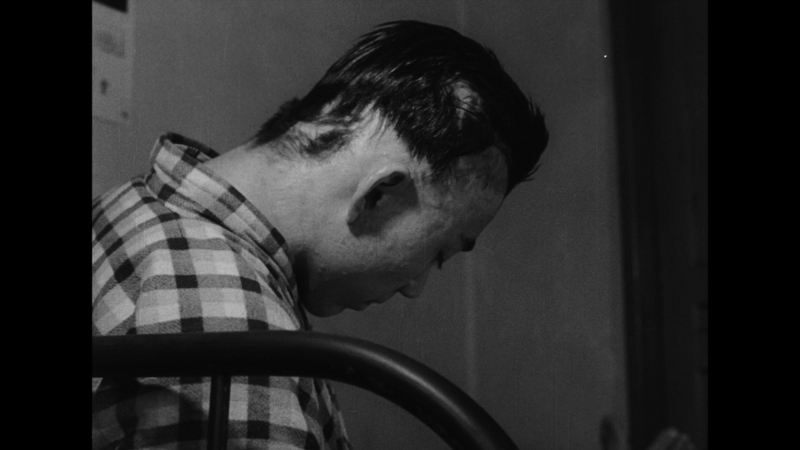 |
|
| Popular Reviews |
| Sponsored Links |
|
|
| Sponsored Links |
|
|
| Release List | Reviews | Shop | Newsletter | Forum | DVD Giveaways | Blu-Ray | Advertise |
|
Copyright 2024 DVDTalk.com All Rights Reserved. Legal Info, Privacy Policy, Terms of Use,
Manage Preferences,
Your Privacy Choices | |||||||









